Be Your Own Health Advocate
That's right. The first 6 months of recovery after your amputation will affect the rest of your life. It's hard work, physically and mentally, to adjust to being an amputee.
Who you choose for your treatment has a huge impact on how those first 6 months turn out. You want to choose a provider that is going to get to know you, work with you to meet goals, help you understand the new reality of your abilities and limitations, and support you throughout the entire process.
And you do get to choose. Doctors make referrals based on who is in-network with their clinic or hospital, and that doesn't always mean it's the best option. This is your life that we're talking about. Whether or not you walk again, how active you'll be years down the line, how your device fits, whether or not you're in pain every day, how you cope with the mental stress... It all comes down to who you have on your team to support you.
You owe it to yourself to at least get a second opinion on your treatment plan. Are you really going to leave it up to chance that you're getting the best care possible?
The New Hope Difference
We are not your typical prosthetics and orthotics clinic. Our treatment plans go above and beyond every other provider in the region, and it all comes down to our three unique pillars:
Integrated Services
We are not the type of clinic who will see you for an initial consultation, fit you for a basic device, and then cut you loose. That's not how we operate. We want to work with you before you even amputate. Our practitioners can help you with bracing or diabetic shoes. We can lay out your options for limb management, and when you do decide it's time to amputate, we can help walk you through every single step of the process.
Supportive Healing
The biggest difference between New Hope Prosthetics and Orthotics and other area clinics is our dedication to your mental health. An amputation is not just a physical stressor; it's a huge mental adjustment.
You need and deserve a treatment provider who has the knowledge and background to provide counseling services and emotional support throughout the transition.
Amputation does not have to mean the end of your mobility. Most patients can get fitted for a prosthesis and regain if not improve upon their pre-amputation mobility range. However, it's not as easy as coming in, strapping on a bionic arm or leg and strolling out of the clinic on the same day. It's weeks and months of treatment and physical therapy. Every day is one step closer to fully healing, but it's still a long process. That can really weigh on someone's mental health.
We have patients who are disappointed in their progress, patients who experience depression, patients who have to cope with issues like phantom limb pain, and some patients who are amputees due to a sudden trauma who didn't have any time to mentally prepare for this new life that they now have to live.
The bottom line? Amputees need a support system that knows the ins and outs of their treatment plan and can help them build a solid mental foundation that will be their rock when recovery gets hard. New Hope is that support system.
New Hope
We are our patient base. Our founder Mike Galster is a below-the-knee amputee, alongside many of our clinicians and practitioners. We understand on a personal level the pain and struggles that come with healing. Everything that we ask you to do throughout the recovery process is something that we've had to do ourselves.
Our unique approach to recovery yields the best results in the industry. New Hope patients are readmitted to hospitals less and are much more likely to adjust early to their new life as an amputee.
Be Your Own Advocate
So what can you do to make sure you're making the right choice for your prosthetic and orthotics clinic?
1. Do your research.
Always look into your options before making a final decision. Ask your doctor who they recommend, but also take into account your own thoughts, opinions, and research. Look into different clinics and their websites. You should be able to find resources available on treatment styles, practitioners' accreditations, their company values, and more. The best thing you can be is informed.
2. Get a second opinion.
No one is going to blame you or give you a hard time for wanting a second opinion. Medical professionals ask for them all of the time, and you deserve to make sure that the treatment plan presented is what's best for you. This is your health and your life. You get to make the decision.
3. Trust your gut.
After you do your research and get a second opinion, trust your gut. If something feels off about the clinic or treatment plan that the hospital is recommending, look into finding another clinic or asking for another treatment plan. Doctors are the experts, and their opinions should be respected, but at the end of the day, you have to be your own advocate to make sure you're getting the treatment you deserve.
Want to learn more about our treatment philosophy and the amputation process as a whole? We offer FREE resources for everyone looking to learn more.
At New Hope, you will not only have the best personal care in the industry, but you will also have access to the most advanced technology currently available. If you have questions about prosthetic limbs, orthotic services, diabetic shoes, or any of our other services, give us a call! We’re conveniently located in 7 cities across Arkansas and Mississippi.

